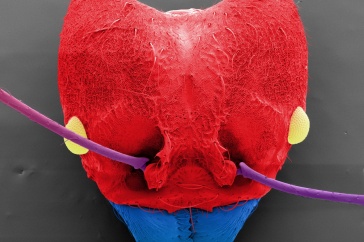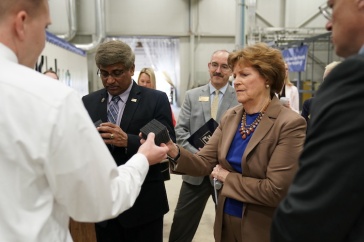As a student in the Veterinary Technology program at the Thompson School of Applied Science in the College of Life Sciences and Agriculture, Tasha Dooley assists Sarah Proctor, D.V.M. in spaying a kitten at the Cocheco Valley Humane Society.
The College of Life Sciences and Agriculture (COLSA) at the University of New Hampshire (UNH) now offers a veterinary technology program within the two-year Animal Science degree at the Thompson School of Applied Science. “This program is an exciting addition to the Thompson school offerings,” says Kim Babbitt, Associate Dean of Academic Affairs. “There is an increasing demand for skilled veterinary technologists, and the hands-on experience we can provide at UNH with both small and large animals will give our students a competitive edge for employment.”
Demonstrating the long-held value of community outreach established by the Thompson School, veterinarian Sarah Proctor works with a variety of animals-in-need to benefit the shelter while simultaneously instructing students in the Applied Animal Science major. It is one of the reasons that an education at the Thompson School is so unique. In addition to hands-on training at the Cocheco Valley Humane Society, two classes are held at the New Hampshire Society for the Prevention of Cruelty to Animals' shelter in Stratham: the small animal practicum and a dog training course called Canine Learning Theory and Application.
Tasha Dooley ’14, who works as an adoption counselor at Cocheco Valley, is also learning techniques to become an effective veterinary technician, developing her skills ranging from intubating a kitten to preparing the skin for surgery. Dooley is one of seven students from the Applied Animal Science major to transfer into the brand new Veterinary Technology concentration, accredited by the American Veterinary Medical Association. With 11 incoming freshman, the need for such a program has already brought the concentration to full capacity for the fall of 2012.
For Proctor, who has been interested in teaching veterinary technology for the past few years, this is a dream come true. “What differentiates us from other programs is our access to and experience with large animals,” says Proctor. “We strike a balance between large and small animals in the program because we have the facilities through the NH Agricultural Experiment Station and UNH equine facilities, we have the professors with the expertise, and we know there’s a growing need for Vet Techs with both small and large animal care experience.”
Dooley, a nontraditional student in Applied Animal Science, served as a military police officer in Germany and Iraq for four years before settling in New Hampshire with her husband, Chris – a native of Farmington – and their four-year-old son, Ethan. She originally came to the Thompson School to prepare for a career in animal training, but developed a love of anatomy as well. “This is the perfect opportunity,” says Dooley. “As a Vet Tech, you really have a service to provide.”
With benefits for all involved, the Veterinary Technology concentration within the Applied Animal Science major is a fine example of the Thompson School’s integration of learning with living in a way that supports the community-at-large.
Originally published by:
UNH Today
Video courtesy of the College of Life Sciences and Agriculture



















































